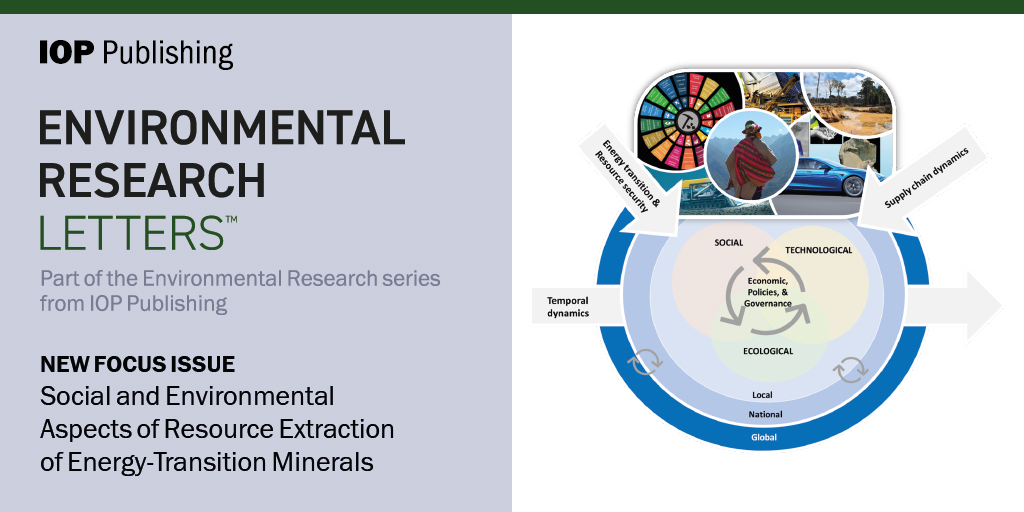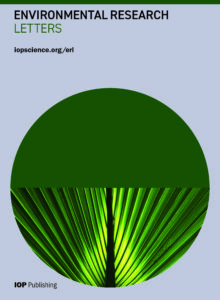ERL特刊征稿|聚焦能源转型矿物资源开采的社会和环境问题

特刊详情
客座编辑
- Datu Buyung Agusdinata,美国亚利桑那州立大学
- Vigya Sharma,澳大利亚昆士兰大学
- Rennie Kaunda,美国科罗拉多矿业大学
- Anabel Marin,英国发展研究所
- Nwike Iloeje,美国阿贡国家实验室
- Kazuyo Matsubae,日本东北大学
- Ken Coates,加拿大育空大学
主题范围
To identify and assess the socio-environmental impacts of resource extraction more effectively, it is critical to understand the concurrent risks, emerging transformations into more sustainable directions, as well as the opportunities and barriers for these transformations to materialize. The urgency of energy transition, compounded by geopolitical uncertainty, is pushing mining to new frontiers, introducing additional risk from the required permitting and approval processes. Sustainable and responsible resource extraction will require innovative technologies that minimize damage and resource consumption, alongside a systematic understanding of regulatory and policy developments. While some countries have implemented new regulations to govern mining activities, most remain ad hoc, and the lack of enforcement undermines their effectiveness. Fresh thinking on circular economy is imperative too, as the current recovery and recycling rate of minerals from mining-related products is alarmingly low.
A holistic approach to resource extraction is needed to ensure the security of mineral supply and to address the associated social, cultural, and environmental impacts. This approach should consider the interconnectedness of the various moving parts of the resource ecosystem, including the different options for mineral extraction, the spatial distribution of ETMs, and the implications of mining for Sustainable Development Goals (SDGs). The overlap of ETMs with indigenous peoples’ and peasant lands highlights the social, cultural, and ecological complexities of mining legacies, such as cultural dispossession and marginalization. Sustainable resource extraction can facilitate the achievement of the SDGs by mitigating negative environmental impacts, safety and health concerns, economic and social inequities, and conflicts.
We invite contributions on topics that include but are not limited to:
- Responsible acquisition processes of critical minerals for the energy transition
- Supply-chain risks for minerals necessary for clean energy technologies
- Life cycle assessments of minerals and circular production and consumption
- Environmental costs of mineral extraction including environmental and social tipping points for the extractives industry with impact on the global decarbonization agenda
- Geopolitical risks to secure minerals for a sustainable energy transition
- Policy alignment to “fast track” projects for energy transition mineral extraction
- The idea of just transition as it applies to resource extraction including addressing injustices faced by indigenous peoples
- Technological innovations for sustainable extraction and mineral resources management
- Drivers of change and stability in the mining industry
- The social and environmental unknowns of Deep Seabed Mining
- New governance models of mineral extraction including telecoupled systems model and indigenous co-ownership in resource extraction
- The roles of extractive industries for the achievement of Sustainable Development Goals (SDGs)
- Mining activities in different systems of government (democracy, authoritarian, monarchy)
- Socio-environmental conflicts as drivers of transformations
- Sustainable and responsible mineral procurement
- Learning the lessons from past mining disasters including tailings failures, environmental pollution, land dispossessions, and cultural destruction
We invite submissions from scholars and practitioners working in broad disciplinary spectrums, including environmental and social sciences, engineering, supply chain management, law, energy systems, policy, and planning. We encourage contributions that draw on diverse methodologies and perspectives, and that explore the intersection of environmental and social issues in resource extraction globally.
投稿流程
特刊文章与ERL期刊常规文章遵循相同的审稿流程和内容标准,并采用同样的投稿模式。
有关准备文章及投稿的详细信息,可以参阅IOPscience页面的作者指南。
作者可登入期刊主页进行在线投稿,先选择“文章类型”,然后在“选择特刊”的下拉框中选择“Focus on Social and Environmental Aspects of Resource Extraction of Energy-Transition Minerals”。
投稿截止日期:2024年4月30日。
期刊介绍

- 2022年影响因子:6.7 Citescore: 10.1
- Environmental Research Letters(ERL)以金色开放获取模式出版,作者可选择将原始数据作为补充资料与文章一起发表。所有研究人员可以免费获取这些研究成果。ERL汇聚了关注环境变化及其应对的研究团体和政策制定团体的意见,涵盖了环境科学的所有方面,出版研究快报、综述文章、观点和社论。ERL顺应了环境科学的跨学科发表的趋势,反映了该领域相关的方法、工具和评估战略,得到了来自不同领域的广泛贡献。
